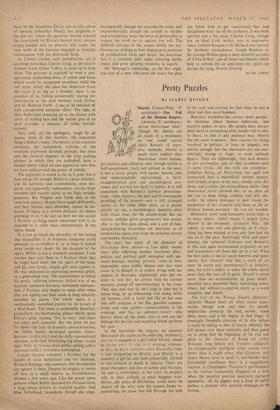Pretty Puzzles
By ISABEL QUIGLY
Muriel. (Cameo-Poly; 'A' certificate.)—The Fall of the Roman Empire.
(Astoria; 'U' certificate.) AFTER Marienbad, what? Though his themes are all muah of a muchness, no one could accuse toy Alain Resnais of repet- -- itive methods. Muriel is
much more explicit than Marienbad, more human, less literary and talkative, and, though stylish (a half-compliment, that), not stylised in the least; it has a story, people with names, houses, jobs and understandable relationshitA, a fairly straightforward plot and psychological pro- cesses that are not too hard to follow. It is still concerned with Resnais's familiar preoccupa- tions—time, memory, the past and its inescapable prodding of the present—and is still arranged rather as his other films were, as a puzzle prettily set out, a psychological detective story with visual clues for the nimble-eyed. But the stylistic oddities grow progressively less notice- able as the film goes ahead, and a sort of hap- hazard-looking naturalism (of character as of camera) has taken over from the previous almost non-human formality.
The story has many of the elements of Hiroshima Mon Athour—a love affair twenty years after reflecting another (wartime) affair; politics and political guilt entangled with per- sonal feelings, making 'privacy,' even in love, impossible, since public themes and sins mast come in to disturb it. A widow living with her stepson in Boulogne impulsively asks her ex- lover to visit her; he arrives with his current mistress, passed off unconvincingly as his niece. They stay and stay (it isn't• long in time but it seems long, as an exhausting visit does), while the woman, with a fairly full life of her own (she sells antiques in her flat, gambles compul- sively and--one gathers—unsuccessfully in the evenings, and has an admirer—lover?--who hovers about all she does), tries to sort out her feelings for the liar and weakling fished up from her past.
In the meantime the stepson, an amateur film-maker (he claims to be collecting 'evidence'), says he is engaged to a girl 'called Muriel, whom
he dashes aw to visit cv:ry evening; whereas, in fact, he has a mistress called Marie-Do (who is just emigrating to Brazil), and Muriel is, a memory, a girl he saw (and presumably allowed to be) tortured to death in Algeria. There are more characters and lots of action and reaction; the past is everywhere, in the town, in people's talk, in their attitude to what happens now. Before, the ashes of Hiroshima could never be shaken off the skin; now the stepson keeps re- membering the snow that fell through the hole
in the roof and covered his bed when he was a child and they were bombed.
Resnais's weakness has always been people: he theorises about human behaviour, but scarcely makes us care. His people have always been hard to sympathise with, harder still to take to heart, to feel in any personal way. Muriel has the same weakness: their reasons for being involved in . politics, in love, in tragedy, are serious enough, but the characters are not con- vincingly loving or tragic or even political figures. They are lightweight, they lack density or just personality, and so their problems tend to seem trivial. All this with one exception : Delphine Seyrig, of Marienbad, but aged and humanised into a marvellous mature beauty, with streaks of grey in her hair, tweedy suits, flat shoes, and a smile—an extraordinary smile—that Marienbad never allowed her, or us, does all she can to keep things credible and felt; she, unlike the others, manages to peer round the symbolism of her situation and show us the in- dividual human presence : the rest are wooden.
Humanity apart (and humanity, worst luck, is its main object: which means it largely fails), Muriel is an extremely attractive film : the colour, at once soft and glowing, as if every- thing has been washed in rain and then had the sun on it; the pace, flatteringly brisk and enter- taining; the technical liveliness and Resnais's in this case quite unrestrained originality of eye and expression—all these add up to a lot. What the film lacks is not so much warmth and spon- taneity (for whoev,er said that a work of art must be warm an•d spontaneous?) as creative- ness, the artist's ability to make the whole worth more than the sum of its parts. Muriel is never more than an accumulation of good detail: beautiful here, powerful there, interesting every- where, but without a separate entity as a work complete and whole.
The Fall of the Roman Empire (director: Anthony Mann) beats all other recent mam- moths, though now and then it's merely elephantine (towards the end, mostly, when three hours and a bit begins to feel long). It cunningly forestalls criticism of its title before it starts by telling us that of course officially the fall spread over three centuries, and then going on to show that the beginning of the end was plain in the character of Rome (or rather Romans) long before any frontiers collapsed. An exceptionally intelligent script sounds even better than it might when Alec Guinness and James Mason have to speak it; and besides their foreseeable excellence there is a magnificent surprise in Christopher Plummer's performance as the vicious Commodus, Emperor at a time when the imperial position positively nurtured egomania: all sly giggles and a kind of awful pathos, a monster who actually manages to be human.


































 Previous page
Previous page